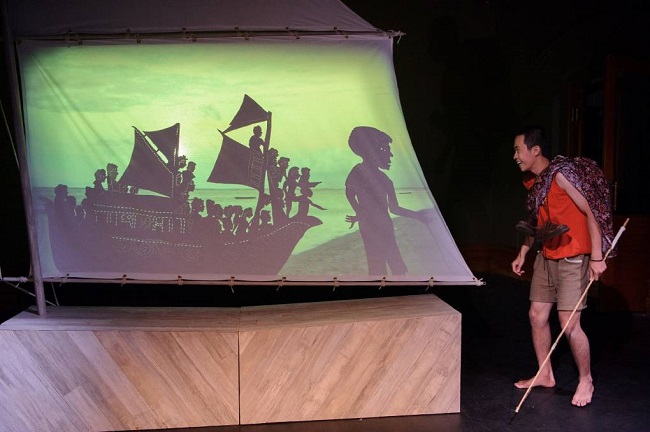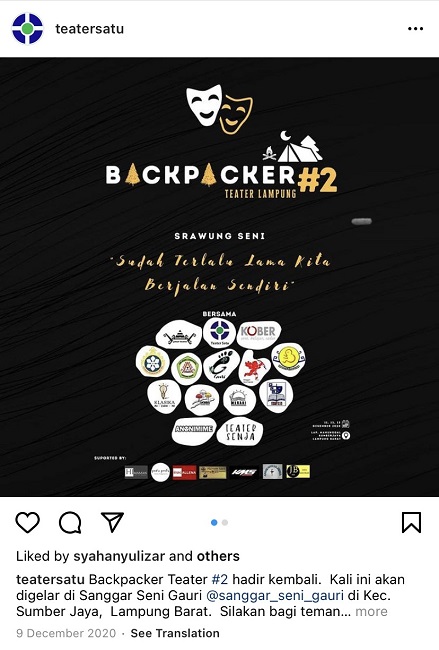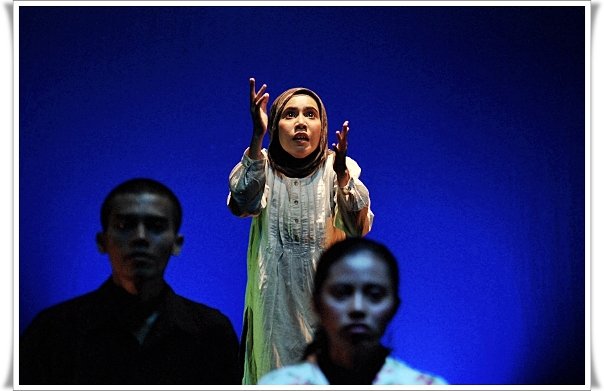Restrictions on social gatherings have prompted creative and innovative responses from within the theatre industry
Restrictions on social gatherings have prompted creative and innovative responses from within the theatre industry
Versi Bh. Indonesia
Iswadi Pratama
The blow of the COVID-19 pandemic struck all areas of life, including theatre and other types of performances. The compulsory policies of social distancing or lockdown naturally impacted directly on the life of theatre, which depends on the involvement of many people, including performers and audiences watching their shows in theatre venues. Indeed, before a performance can be staged the process of its creation has already involved many artists: the production team, the artistic team, performers, the stage crew and others.
This fact rendered artists in all areas of performance, theatre, dance and music totally unable to continue their creative process, while at the same time the economic sector was experiencing a huge shock.
The Indonesian government, through the Department of Education and Culture, established various policies to assist artists to maintain creativity - including the provision of monetary assistance. However, to access this funding, theatre artists had to create a short work in the form of a monologue and send it to curators appointed by the government. It was these curators who determined which works were worthy of receiving a monetary ‘reward’. The government carried out this activity with a number of variations of themes and organising bodies. But substantially the intentions were the same: giving monetary help to assist theatre artists.
I don’t see this as an appropriate strategy.
This activity is similar to the competitions participated in by senior high school students, on a broader scale and with greater monetary assistance. Indonesian theatre needs a more comprehensive policy to consider all dimensions of the problems experienced by artists during this pandemic.
On the other hand, theatre artists in Indonesia, and I think all over the world, have attempted to hold on, and overcome the difficulties caused by the pandemic, by rebroadcasting documentaries of their work, or creating new works in video format so that they can be shown on various social media, such as Instagram, YouTube, among others. In the same way, activities in the form of workshops, seminars, even theatre competitions for school and university students have used digital technology as a medium for broadcasting their work. This seems to be the most widely accepted strategy for ensuring the continuation of the creative process in theatre.
This kind of theatre can be staged more immediately, efficiently, quickly and cheaply, however these advantages have to be paid for by a loss of intensity in the creative process and the loss of the mesmerising effect of live theatre. Significantly, it becomes increasingly difficult for theatre artists to earn an income from ticket sales because watching theatre through social media is still something foreign to the Indonesian public. Even attracting audiences to watch live theatre by buying tickets is something only possible for well-known theatre groups in major cities. While in small cities theatre is usually performed for free or ticketed at very low prices. Now, the COVID-19 pandemic slowly but surely has introduced a new trend, Indonesian theatre is becoming ‘documentary theatre’, theatre shown via video.
Another trend is to present theatre performances with a restricted number of actors (two to five people) to maintain social distancing on the stage. The performance takes place in a theatre with no audience or just a tiny audience and is then broadcast through social media. Watching theatre in this way is like watching the presentation of a work. We lose the enchantment and the power of direct interaction of live theatre. Theatre as a ‘direct bringing into being of an event’ is very different from video or film. It cannot and should not become simply documentation or presentation of a created work.
Necessity is the mother of invention
During this pandemic what can a theatre community do to preserve its creative process other than taking full advantage of the facilities promised by technology? To answer this question, I would like to tell the story of the experiences of Teater Satu since the government first declared COVID 19 a pandemic in April 2020.
Teater Satu is regarded as quite a productive Indonesian theatre group. Every year it produces at least three performances, both on a local and national scale, and occasionally internationally. As well as staging performances Teater Satu organises workshops, seminars and discussions about acting or theatre more generally. It also holds activities for its members such as writing practice and classes in literature, philosophy, anthropology and even spiritualism. This has been continuing for almost 20 years. From the end of 2019 until early 2020 Teater Satu held a program of theatre appreciation for middle high school students in Bandar Lampung by staging a few short performances at the Teater Satu community headquarters.

Once a fortnight the company stages a performance watched by a maximum of 150 pupils, who purchase tickets at a reasonable price for high school students, with the cost much less than those sold at movie theatres. The program was an attempt by Teater Satu to introduce theatre to a group of adolescent students who are typically becoming more and more addicted to popular entertainment such as Korean soap operas and losing their familiarity with and ability to appreciate works of literature and theatre.
However, when this program had been underway for about four months, at the beginning of April the government declared COVID-19 to be a pandemic and prohibited all activities with the potential to attract large crowds of people. From that time until the end of April none of the workshops and performances by various communities and artists, could take place. Spending 30 days without any activities at all, including routine daily exercises, felt very oppressive and gave rise to feelings of depression. Finally, all the members of Teater Satu held a Zoom meeting to find a solution and decide what they could do so that theatre activities could continue.
We came up with the idea of continuing to hold routine training but limiting the number involved in the training to four actors taking turns each day. In order to participate in the training actors had to be tested by health authorities to make sure they did not have COVID-19. Another idea was to re-read play scripts that we had performed previously via virtual media and broadcast them via Instagram or a YouTube channel.
Along with these two ways of handling the pandemic, Teater Satu formed a new section of the organisation which we called the Media Team. This team became the backbone of Teater Satu in producing theatre activities through social media, so that the general public could follow them. One of the steps taken by this team was to create YouTube content entitled, ‘Belajar Teater’. In this way the Teater Satu broadcast classes in acting and theatre generally once a week. This content was directed at trainee actors as well as school teachers and students to add to their dramatic knowledge and skillset. In addition, through the Teater Satu YouTube channel, we created a program about creating literature and analysing art for film and stage actors.
Reaching out
After the internal creative process during the pandemic had been established, we also created a program that could be followed by all theatre communities in Lampung called ‘Backpacker Theatre’. This was a place where all theatre communities in Lampung could gather together to safeguard the creative process in the midst of COVID-19. Our intention is that Backpacker Theatre should continue to operate for the next five years with the following aims:
- To bring to life, safeguard and refresh the arts communities in the province of Lampung.
- To create and develop together an arts ecosystem in Lampung.
- That for the next five years all theatre communities in Lampung should hold regular activities with people taking turns to organise them.
- To use information technology and social media as a platform to support the creative process and reach a wider audience.
Backpacker Theatre, which is now being established as a legal entity, has gathered together 20 theatre communities throughout the province of Lampung (about 200 theatre artists.)

In addition, we have chosen six groups judged as capable of organising one arts event each year. Every year there will be six events, consisting of workshops, discussions and regular theatre performances (once every two months) for five years, from 2020 to 2026.
These six events have to be presented with all group members observing the protocols for the New Normal era announced by the government.
The first activity of the Backpacker Theatre program took place in October 2020, and was followed by a second in early December. Along with theatre communities, the Backpacker Theatre program in Lampung has now become a role model for dance communities that carried out the first of its activities in early December. All these activities, involving both theatre and dance, may only be undertaken after receiving permission from the government and under supervision by COVID-19 security teams.
This is what the members of Teater Satu have done to safeguard the creative process, both for themselves and other performance communities in Lampung during the pandemic. Through all these efforts we hope that, along with performances, discussions and workshops carried out virtually, theatre will have spaces for direct meetings between performing artists and the communities which enjoy their work and among the artists themselves. These live meetings are vital in helping to sustain the energy and key strengths of theatre which distinguishes it from other art forms.
Iswadi Pratama (teatersatu96@gmail.com) is a playwright, director, and the founder and director of Teater Satu Lampung.












